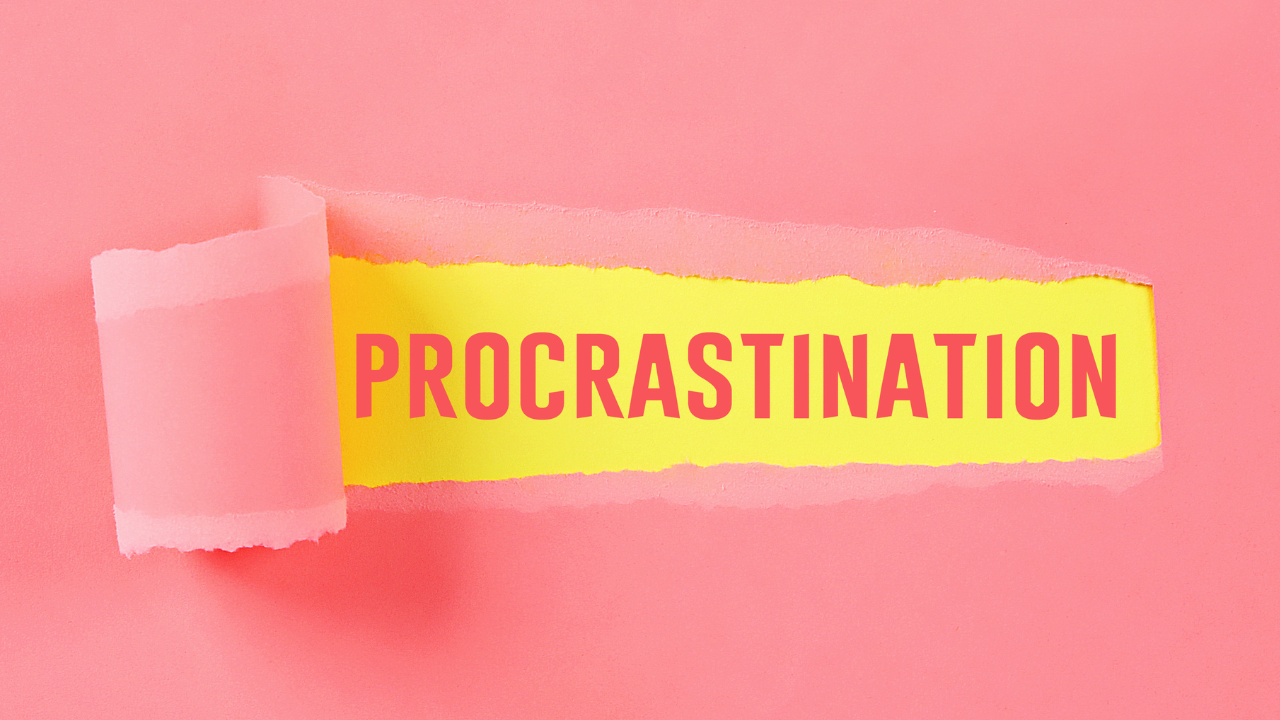Embracing Procrastination: Uncovering Its Hidden Benefits
However, what if we were to view procrastination from a different angle? What if it could offer valuable insights into our psychology and even benefit us in certain situations?

Procrastination is a word that often carries a negative connotation, synonymous with wasted time, missed opportunities, and self-indulgence. Most of us have experienced the guilt and frustration that comes with putting off important tasks. However, what if we were to view procrastination from a different angle? What if it could offer valuable insights into our psychology and even benefit us in certain situations? In this article, we will explore the behaviour of procrastination, examine its potential benefits, discuss its unique effects on women, and introduce a science-based model that can help individuals harness procrastination in a positive way.
Understanding Procrastination
Procrastination is the act of delaying or postponing tasks or decisions, often in favour of more immediate and less important activities.
“I definitely do this when I know I need to complete my tax return” - Joanne!.
While it is commonly seen as a hindrance to productivity, it is essential to recognise that procrastination is a complex behaviour influenced by various factors, including individual differences, motivation, and external circumstances.
Procrastination as a Coping Mechanism
Procrastination can serve as a coping mechanism in times of stress or when facing overwhelming tasks. It allows individuals to temporarily avoid anxiety-provoking situations or emotions. Women, in particular, often juggle numerous responsibilities, including work, family, and social commitments. In these situations, procrastination can provide a ‘brief’ respite, allowing them to recharge and manage their stress levels.
The Benefits of Creative Procrastination
Psychologists *(Alina Yamaha & Skintaro Yukawa) have noted that procrastination can lead to enhanced creativity and problem-solving skills. When we delay a task, our minds continue to work on it subconsciously. This process, known as "incubation," can lead to fresh insights and innovative solutions. People who frequently engage in multitasking and are responsible for managing complex schedules, may find that creative procrastination provides them with novel perspectives and creative ideas.
Procrastination and Emotional Regulation
Procrastination can also serve as a tool for emotional regulation. Women tend to be more attuned to their emotions, and delaying a task can provide an opportunity to process and manage these emotions effectively. By taking a step back and allowing emotions to settle, you may ultimately make better decisions and take more thoughtful actions.
The Positive Side of Perfectionism
Many people exhibit perfectionistic tendencies, which can lead to higher standards and expectations for themselves. While perfectionism can sometimes lead to procrastination due to the fear of not meeting these high standards, it can also drive individuals to produce exceptional work when they do decide to tackle a task. Procrastination can serve as a means to gather more information, refine ideas, and ensure that the final product meets these lofty standards.
Procrastination and Impulsive Decision Making
Procrastination can act as a natural buffer against impulsive decisions. Instead of making choices hastily, procrastination encourages you to delay until you've had more time to weigh the pros and cons and consider the long-term consequences. Ever done a late night shop after a few glasses of your favourite tipple? Procrastination can help you to keep an eye on your finances or be a guide to assess whether you really want to do something. Greater understanding can help you make better decisions create focus and allow you to spend time on tasks and experiences more aligned to you.

Procrastination's Gendered Effects
It is crucial to acknowledge that procrastination can affect individuals differently based on their gender and societal expectations. Women, in particular, often face unique challenges that can impact their procrastination behaviours.
- The "Superwoman" Tendency: Women are frequently expected to excel in multiple roles, from caregiving to professional work. The pressure to be a "superwoman" can lead to increased stress and, at times, procrastination as a means of coping with these overwhelming expectations.
- Stereotype Threat: Gender stereotypes can influence women's self-perception and performance. When women are aware of negative stereotypes, such as the belief that they are less competent in certain fields, it can create anxiety and contribute to procrastination as a way to avoid confirming these stereotypes.
- Work-Life Balance: Balancing career and family responsibilities can be particularly challenging for women. The constant juggling of roles and responsibilities may lead to procrastination as women seek moments of reprieve amidst their busy lives.
The Science-Based Model: The Two-Minute Rule
One useful model that can help individuals, including women, manage procrastination in a positive way is the "Two-Minute Rule." This concept, popularised by productivity expert David Allen, suggests that if a task can be completed in two minutes or less, it should be done immediately. By addressing small, manageable tasks promptly, individuals can experience a sense of accomplishment and reduce the likelihood of these tasks piling up and becoming sources of procrastination. The Two-Minute Rule encourages individuals to tackle minor tasks head-on, freeing up mental space and motivation for more significant endeavors.
Harnessing Procrastination for Women's Empowerment
While acknowledging that procrastination can have its benefits, it is essential to strike a balance between embracing it as a coping mechanism and recognising when it becomes a hindrance. Here are some strategies to help you harness procrastination in a positive way:
- Mindful Procrastination: Be mindful of when and why procrastination occurs. Use this awareness to differentiate between productive delay and avoidance due to stress or anxiety.
- Set Realistic Expectations: Challenge unrealistic expectations and any "superwoman" behaviours. Acknowledge that it's okay to ask for help and to set boundaries.
- Positive Self-Talk: Combat stereotype threat with positive self-talk and affirmations. Recognise your strengths and capabilities, irrespective of gender-based stereotypes.
- Strategic Procrastination: Identify tasks that benefit from creative procrastination and those that require immediate attention. Align your energy levels with tasks that match your circadian rhythms.
- Utilise the Two-Minute Rule: Embrace the Two-Minute Rule to tackle small tasks promptly, reducing the likelihood of feeling overwhelmed by accumulated responsibilities.
Procrastination, often viewed as an enemy of productivity, can reveal valuable insights into our psychology and offer unique benefits, especially for women who navigate complex roles and societal expectations. By understanding the reasons behind procrastination and using science-based models like the Two-Minute Rule, individuals can harness procrastination as a tool for creativity, emotional regulation, and improved decision-making. It is essential to recognise that procrastination is not inherently negative but rather a behavior that, when managed mindfully, can empower women to thrive in their diverse roles and pursuits.
So procrastinate with awareness!
If you need help working through some challenges you may be procrastinating about then get in touch. You can book a call with us or email us at info@confidencecollaborative.com.
You can also join us in the Confident Career Club to elevate your career skills, your mindset and your wellbeing.
Joanne and Maggie
*Research: Yamaoka A, Yukawa S. Does Mind Wandering During the Thought Incubation Period Improve Creativity and Worsen Mood? Psychol Rep. 2020 Oct;123(5):1785-1800. doi: 10.1177/0033294119896039. Epub 2019 Dec 19. PMID: 31856642.